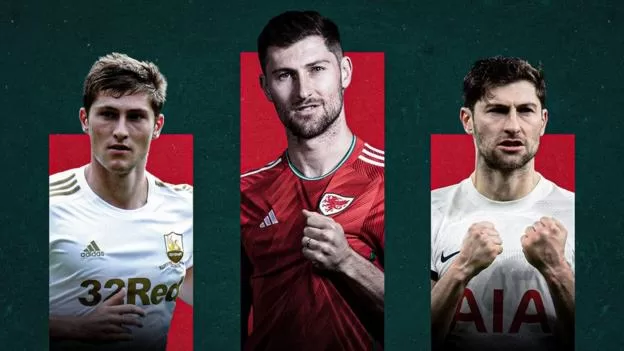
| Venue: Cardiff City Stadium Date: Thursday, 21 March Kick-off: 19:45 GMT |
| Coverage: Live on BBC Radio 5 Live, BBC Radio Wales, BBC Radio Cymru, BBC Sounds, BBC Sport website and app, plus live text |
| Highlights: Match of the Day Wales, BBC One Wales from 22:40 and later on demand |
Ben Davies is a reluctant star. He is the rock around which Wales’ defence is built, and Tottenham’s longest-serving current player, yet Davies is not celebrated like some of his peers.
That is partly by design from the 30-year-old, who is happy to cloak himself in the relative anonymity which comes with playing alongside the likes of Gareth Bale and Harry Kane.
Try as he might to avoid the spotlight, though, Davies’ quality shines through – and his interventions have helped change the course of history for his teams.
There was the goal-saving clearance against Slovakia at Euro 2016, without which Wales’ ascent to the semi-finals may never have got off the ground.
Then there was the Champions League semi-final in 2019. It was his interception which led to Tottenham’s last-gasp winner to seal one of the most dramatic comebacks of all time.
Now Davies wears the captain’s armband for his country – albeit in the absence of regular skipper Aaron Ramsey – it is a little harder for him to go unnoticed.
Wales will look to take a significant stride towards qualifying for Euro 2024 when they host Finland in their play-off semi-final on Thursday.
In Davies, they have a model of consistency and calm authority, a player his team cannot do without.
‘The only Premier League player with wind-down windows’
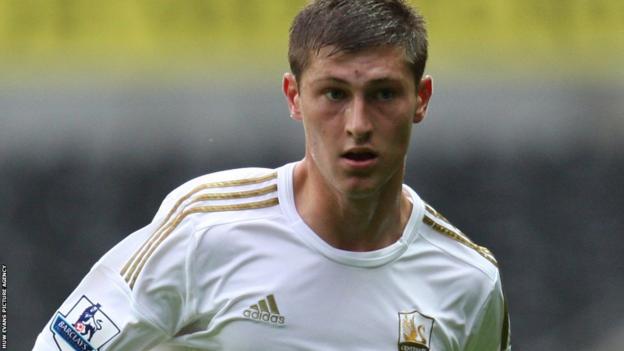
Davies has always tried to keep a low profile, a quietly intelligent character who has worn his wisdom lightly from a young age.
Born in Neath, Davies showed promise as a rugby player while studying at Ysgol Gyfun Ystalyfera but, as a Swansea City season ticket holder, football was his true passion.
He watched the likes of Leon Britton and Alan Tate from the North Bank at the Vetch and, having progressed through the Swans’ youth set-up, he was soon referring to his childhood heroes as team-mates.
“You could see from training with us he was always someone who wanted to learn,” says Tate.
“He was one of those young lads to ask questions and took on information and was really diligent around the game.
“On the whole he was quiet and, to be fair, you usually are as the young lad breaking into the team. Ben was what you see now.”
Davies rose to the first-team ranks so quickly that he was still on a youth contract, worth around £400 per week, when he made his Premier League debut aged 19 in August 2012.
He was also still driving an old Volkswagen Polo, complete with wind-down windows, much to the amusement of the rest of the squad.
“That came from Ashley Williams,” Tate recalls with a laugh. “Ash was big on his cars and stuff, so I think he was the first one who noticed Ben had the wind-down windows and he didn’t let him forget it. That is, he reminded him every minute of every day!
“He was coming into what was a changing dressing room with the influx of foreign lads. But you still had a core of British lads who had grown up with each other, and we were quite harsh with each other. He came in and he thrived amongst it.
“He got on well with the Spanish players and other foreign lads as well. He and Michu got on well and used to speak a lot. I don’t know how good Ben’s Spanish was, though.”
A serious injury to left-back Neil Taylor meant Davies soon made that position his own and, though he flourished there, his manager at the time, Michael Laudrup, said that he saw his future at centre-back – while also predicting “we will see Ben at one of the top five or six clubs in the Premier League”.
Wales manager Chris Coleman seemed to agree. After just eight appearances for Swansea, Davies earned his first senior cap, starting a home World Cup qualifier against Scotland.
“He’d started brilliantly for Swansea and you knew it was only a matter of time until he got the call-up for Wales,” says Joe Allen, who was in the Wales team that night.
“It was clear straightaway that he was very smart, a very intelligent guy, well-liked and very popular with the younger pros, but also I think all the first-team lads really respected him.
“Although he might not have been the loudest or the biggest extrovert, you could see he was quietly very confident and composed.
“He was definitely one of the lads in that group that you knew would be a key member and stalwart for Wales, as he’s proven in all the years that have come since.”
‘A top player with a sensible head – but enjoys a good time’
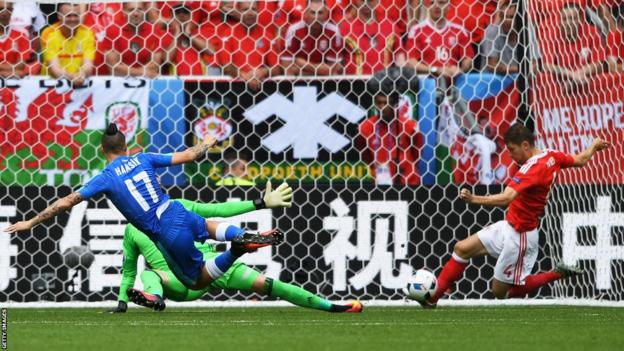
Davies took his first steps in international football at a difficult time for Wales, who struggled during the early stages of Coleman’s tenure following the death of his predecessor Gary Speed.
With the likes of Gareth Bale, Aaron Ramsey and Allen a few years further along in their development, however, Wales had the makings of a promising new generation.
“We never lost faith that things were getting better and we were progressing,” Allen says.
“We had a rough patch and we had some terrible results but you looked around the squad and I think everyone believed that these lads, with the right experience and with enough time, would go on and do great things for Wales.”
They achieved that greatness at Euro 2016, not only qualifying for Wales’ first major tournament for 58 years but then reaching a first semi-final in the country’s history.
When minds drift back to that golden summer in France, the dominant memories tend to be Hal Robson-Kanu’s goal against Belgium, Bale’s many wondrous moments, or the national anthem in the glorious Bordeaux sunshine before opening game against Slovakia.
It might have all unravelled after just three minutes of that first match, though, had Davies not intervened.
Slovakia’s Marek Hamsik had weaved his way through the Welsh defence and shot past goalkeeper Danny Ward, only for Davies to appear from nowhere with a sliding clearance to deny a certain goal.
“That was such a key moment,” says Allen, who would go on to be named in Uefa’s team of the tournament.
“It maybe gets overlooked by some but a lot of people realise how vital that moment was, and just how well he played in that tournament.
“The whole squad performed out of our skins, but he was a stand-out for us. He was still only 23 at the time and playing like a real senior head. A top player who had a top tournament and really stood out.”
When Wales lost to eventual champions Portugal in the semi-finals, much was made of the absence of the suspended Ramsey – but the fact they were missing Davies for the same reason was arguably as significant.
Naturally, there was disappointment that Wales’ epic run had come to an end but the overriding emotion after the final whistle was one of pride.
Wales’ players and staff reflected on their achievement with friends and family in Lyon that night, before travelling back to their training base in Dinard, Brittany, the following morning.
There, they had a rare thing in a footballer’s diary: 24 free hours to cut loose. Allen grins at the memory, hazy as it might be.
“Ben’s got a sensible head on him but, like anyone, he enjoys a good time,” he says.
“And yes, certainly on Wales camps, we’ve had plenty of them. After the Euros we was on top form, we enjoyed that and he was right amongst things.”
Pochettino’s first signing, Son’s best friend at Spurs
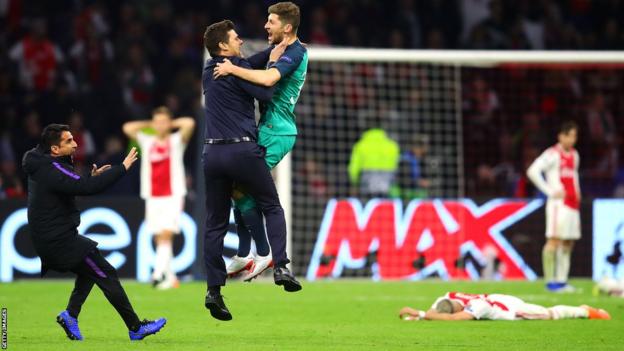
When Davies was asked about that block before Wales met Slovakia again three years later, he simply remarked: “It’s a good memory, but hopefully I won’t have to do it again this time around.”
Those moments are all well and good, Davies thought, but he would prefer a straightforward victory, a clean sheet and, frankly, less of a fuss.
By this time, however, he had already joined Tottenham, with whom he would play in one of the most extraordinary ties in Champions League history.
Just 24 hours after Liverpool had overturned a 3-0 first-leg deficit to stun Barcelona at Anfield, Spurs mounted another comeback for the ages against Ajax.
Trailing 3-0 on aggregate with 35 minutes left to play in Amsterdam, two Lucas Moura goals had dragged Tottenham back into contention.
Then in the sixth minute of added time, Davies intercepted an Ajax clearance to launch the counter-attack which culminated in Moura’s hat-trick and sealed the most dumbfounding of triumphs on away goals.
At the final whistle, it was telling that then-Tottenham manager Mauricio Pochettino, overcome with emotion, ran on to the pitch and leapt into Davies’ arms.
The Welshman had been Pochettino’s first signing following his appointment in 2014 and, five years later, Davies was the first person with whom the Argentine shared his greatest moment as Spurs boss.
“He is still young but his mentality, his maturity – he is so professional – he is helping the team every season,” Pochettino said.
“He’s fantastic, not only today but from the day he arrived. He’s a great professional, a great player and a great man.”
Davies is now Tottenham’s longest-serving current player, with more than 300 appearances to his name.
He counts Son Heung-min as one of his best friends, making the South Korean superstar an honorary member of Spurs’ self-styled ‘Welsh Mafia’ alongside Bale and Joe Rodon.
“Ben is one of my closest friends,” Son said earlier this season. “He helped me settle in London very well.”
Davies and Son caught a train from London to Cardiff together before Wales played South Korea in a friendly last September.
True to form and even with one of the world’s most globally renowned footballers for company, Davies managed to navigate the journey without much attention, gave Son a hug goodbye on the platform at Cardiff Central and set off to rejoin the Wales squad.
Student, father and ‘natural leader’
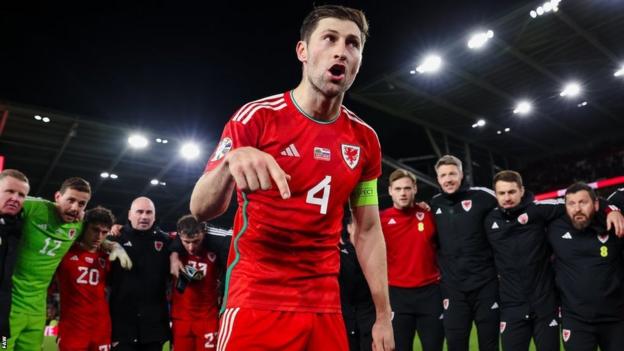
If Davies is unusually low-key for a Premier League footballer, one of the reasons is that there is more to his life than football alone.
He has an Open University degree in business and economics – graduating with a 2:1 after studying for five years alongside his day job – and attended last month’s FT Business of Football summit, as an observer rather than a guest speaker.
On the rare occasions he has spoken about his other interests, Davies has explained the degree is something he does want to “shout about from the rooftops”.
Davies has always been an amenable and articulate interviewee – and is good company when the mics are off – but he would rather not talk about himself at any great length.
He became a father for the first time last year when his wife Emily gave birth to their son Ralph but, while sharing the occasional update on social media, Davies understandably likes to keep his private life private.
“It’s the best feeling in the world. There’s nothing much more to say than that,” he said when asked by this reporter about new fatherhood. “A few tired nights but I love it.” Polite as ever, but brief.
Yet while Davies is happier away from the glare of public attention, do not think that he is any way timid.
The defender showed his other, more animated side when he addressed his team-mates in an impromptu post-match huddle after Wales’ stirring victory over Croatia last October.
Gesturing with the zeal of a street preacher in the middle of a circle of players and staff, Davies delivered a rousing speech which referenced Dafydd Iwan’s iconic Yma o Hyd, a Welsh-language protest song with a title which translates as ‘Still Here’.
It has become an anthem for Welsh football in recent years, and Davies was using it to illustrate how Wales were still standing after a turbulent qualifying campaign.
“On top of all the other great traits, he’s a real natural leader,” says Allen.
“He has a massive influence on that squad. That’s been vital in the past and still is now.”
Davies was close to being named Wales’ permanent captain when Ramsey succeeded Bale last year but, given Ramsey’s frequent absences because of injury, the defender is getting used to wearing the armband.
“Ben’s captain material and he will absolutely be a future captain whenever that is,” Wales manager Robert Page says.
It is expected that Davies will captain Wales against Finland on Thursday, with Ramsey likely to have his involvement limited as he returns from his latest injury.
If Ramsey makes a quicker recovery than forecast and leads the team out at Cardiff City Stadium, Davies will still be there of course – as important to the side as ever – but just not front and centre. Just as he likes it.
